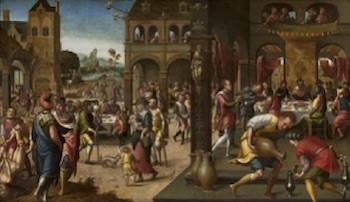The King’s Wedding Feast
Homily by Father Robert Chiesa, SJ 28th Sunday in Ordinary Time[A] at 12 Noon Mass ~ St. Ignatius Church

In today’s gospel Matthew recounts a parable which Jesus used to challenge the religious and political officials of his day. Luke, too, has the same parable but handles it differently. So how did Matthew view the parable when he recorded it some 50 years maybe after the death and resurrection of Jesus? We should also be aware that he is writing after the total destruction of Jerusalem in the year 70.
In today’s reading from the Old Testament, the ultimate goal of life is symbolized by a sumptuous banquet of fine food and good wine provided by God for all his children. Today’s Gospel reading takes up this image and pictures it as a wedding banquet held by a king for his son. The invitations are sent out well in advance so that everyone can prepare and look forward to it—a wedding banquet in the king’s palace!
So, when the day arrives and the food is ready, servants are sent out to summon the guests, but they simply ignore the invitation. So more servants are sent out. Again the guests that have been invited refuse—some refuse outright, others offer excuses: they are busy with their farm or other business. Some actually seize the servants, mistreat them and even kill them.
Here we gradually see how Matthew is building on the original parable by showing how it looks back over the history of God’s relations with his people Israel. God has always been open, eager to invite his people to greater union with God and with one another in a great banquet. Many servants were sent to Israel. These were the prophets like Isaiah, Jeremiah and many others. But the people ignored God’s call through the prophets. So other messengers were sent. Matthew probably sees this second group as the first Christian missionaries to the Jewish people during the first years after Jesus. These servants, these Christian missionaries, too, are rejected and even put to death. By the time Matthew is writing, there have been several persecutions and martyrdoms of Christian believers.
Then the great Jewish War came against the Rome Empire, resulting in the total destruction of Jerusalem in 70 AD. This is probably what Matthew is referring to when he says the king dispatched his troops, destroyed those murderers, and burnt their town.
So the king looks elsewhere for guests. He sends servants out for the third time, telling them to bring in everyone they can find. This seems to refer to the call of the Gentiles to replace the Jewish people who have rejected Jesus. These servants bring in everyone and the wedding hall is filled with Gentiles from all over, ourselves included.
Then there is the man without a wedding garment. We might wonder how everyone called so suddenly was supposed to have dressed up for the occasion, but someone has suggested that the wedding robes were handed out as people came through the palace gate. Anyway, there is one bloke there without a wedding garment and he is promptly dismissed into the outer darkness.
As we read the parable, we have to remind ourselves that it is a parable, a story of a king, who gets quite upset about being ignored, burns the town of those who kill his servants, and then he himself brings harsh treatment on the man without the wedding garment.
I said we have to remind ourselves that it is a story about an imaginary king, because in some ways we tend to see the king as God the Father preparing a banquet for his Son Jesus and we find it very troubling to see that king getting so angry and revengeful. So what can we take away from this parable and apply to ourselves, just as Matthew applied it to his own generation of martyrs and the destruction of Jerusalem?
God is preparing a banquet for all his children and wants to see them all sitting around the table, enjoying abundant life, full of joy and happiness. All are invited. No one is excluded. Jesus himself shows us this by sitting at table with everyone, even being criticized for eating with people that were considered sinners and undesirable. He wanted us to get the picture of what God wants to do. Jesus understood life as a great invitation from God. It is a freely given invitation and needs to be answered freely.
But Jesus was a realist. He was aware that the invitation might be refused. Even today many people do not have the time or the heart to hear the call from God. They are taken up with themselves and their own interests. The man without the wedding robe represents all those who have accepted the invitation but do not undergo the conversion of life required for entrance into the eternal banquet. Those who pretend to be Christians while in reality living a sinful life are no better off than those who refused to accept Jesus in the first place.
For many people, happiness lies in owning more, buying or selling more, having more things and, hopefully, more security. They try to escape from their problems by plunging into the pleasures of entertainment, parties, drugs, sex, faster cars, and more sophisticated gadgets. We can keep on running away from ourselves by losing ourselves in a myriad of interests, trying to forget God and our ultimate goal of life. Like the man thrown out into the darkness, we have to take the responsibility for the consequences of our misbehaving.
But God cannot be stopped. The invitation keeps coming into the depth of our soul despite our refusals and our self-interest. No, God is not absent from us. We are the ones that are absent if we turn a deaf ear to God’s invitations. We Christians are warned not to relax in the mere fact of having been called as God’s people. As we celebrate this Eucharist, a symbol of the eternal banquet, let us examine our conscience and see how open we are to invitations from God. How self-centered are we? And how open are we to others? How do we behave toward the least of Christ’s brothers and sisters whom we meet every day and of whom he says “What you do to the least of my brethren you do to me”? Invitations from God come to us through the people and events we meet day by day, today, tomorrow.

 ENGLISH
ENGLISH  ESPAÑOL
ESPAÑOL 








